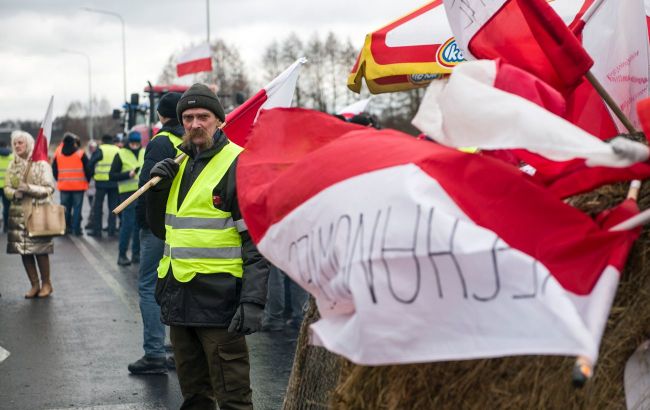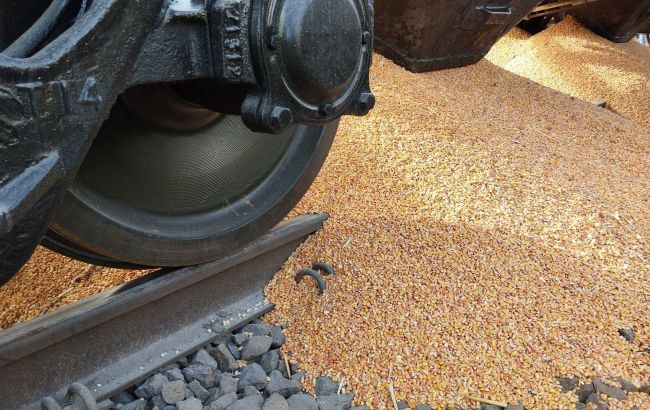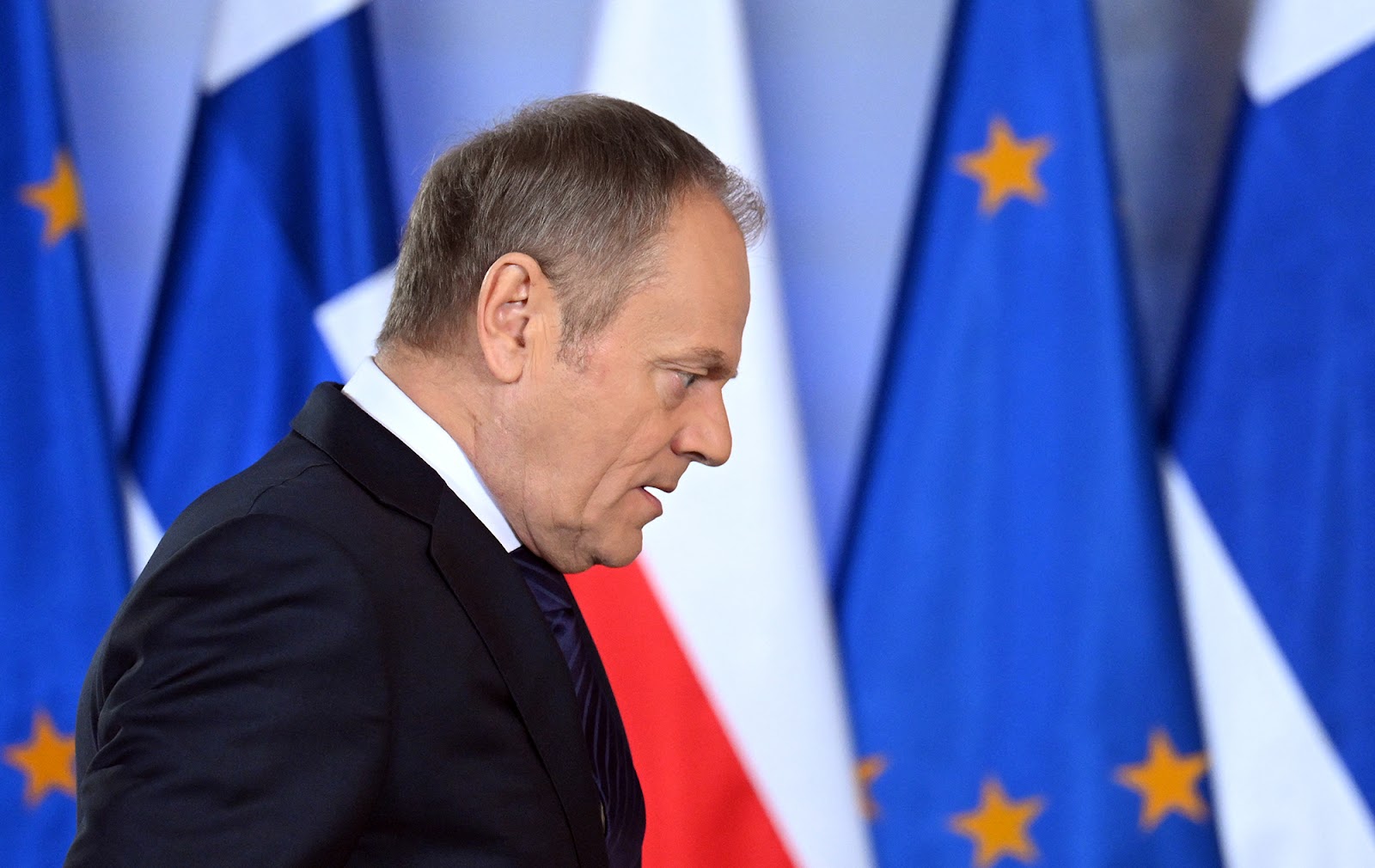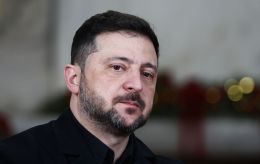Polish-Ukrainian border blockade: How Kyiv and Warsaw plan to halt farmer protests
 Protests on the Ukrainian-Polish border
Protests on the Ukrainian-Polish border
The tension on the Ukrainian-Polish border may ease in the coming days. Despite repeated negotiations between officials of the two countries, no compromise has been found. However, RBC-Ukraine has learned about possible steps by Poland and Ukraine that will not solve trade problems but may help ease the border blockade.
Sources used: public comments by officials of Ukraine and Poland, information from the publication's sources familiar with the process of Ukrainian-Polish negotiations, and expert comments.
In the second half of February, the situation on the Ukrainian-Polish border began to escalate every day. Polish farmers, who started protests and blocked freight traffic at three checkpoints on February 9, expanded their actions to all six checkpoints. Temporarily, all road transport was blocked, and there were attempts to block the railroad.
There are still threats to completely block the transportation connection. "If we decide not to allow buses to go through, it will be very bad. But maybe then our government will finally look for meaningful solutions," one of the leaders of the Polish protesters said recently.
Ukraine and Poland - different views on the situation
So far, the Ukrainian and Polish authorities have different views on how to solve the problem. Ukraine, after repeated and unsuccessful attempts to ease tensions at the border through diplomatic negotiations at the level of relevant ministries, finally realized that the problem could not be solved without raising the issue at the highest level.
President Volodymyr Zelenskyy addressed the Polish leadership with a proposal to meet for a dialogue right on the border by February 24. "And I ask you, Donald, Mr. Prime Minister (Donald Tusk, Prime Minister of Poland - ed.), to come to the border as well. Andrzej (Andrzej Duda - Polish President - ed.), Mr. President, I ask you to support this dialog. This is national security. We must not delay it. The coming days give us a chance to do this," Zelenskyy said.
The trigger for this reaction was the ongoing provocations at the border, when protesters began to dump Ukrainian grain directly onto the road. First, they damaged several trucks, and then a railroad car that was transporting grain in transit to Germany.

Ukrainian grain dumped on the border with Poland (photo: suspilne.media)
The Polish prosecutor's office launched an investigation into these facts. Prime Minister Tusk defended the protesters, calling their actions a manifestation of desperation. President Duda said he regretted what happened. "But, on the other hand, please also remember that Poland is a democratic country where the right to protest simply exists," he said in an interview with Ukrainian Radio.
Later, Polish Consul General in Lviv Eliza Dzwonkiewicz called the incidents at the border a disgrace for the Poles. "I cannot pretend that I do not see these shameful actions of Poland on the Polish-Ukrainian border. I apologize to you, dear Ukrainian friends. What is happening cannot be the work of my compatriots," she wrote on Facebook.
But the provocations continued. Indignation, not only in Ukraine but also in Poland, was caused by the act of one of the protesters who hung a flag of the former USSR on his tractor and a poster calling on Putin to "restore order with Ukraine, Poland, and Brussels."
_2.png) Provocation on the border with Poland (photo: Getty Images)
Provocation on the border with Poland (photo: Getty Images)
The Polish Foreign Ministry immediately condemned the provocation. "We believe that this is an attempt to hijack the agrarian protest movement by extreme and irresponsible groups, possibly under the influence of Russian agents," the Ministry said.
The farmer who hung the flag and poster was detained. He faces up to 3 years in prison. A source familiar with the process of Ukrainian-Polish negotiations believes that the share of Russian influence on the situation is not as great as it sometimes seems. "We shouldn't exaggerate, but we shouldn't underestimate Russia's influence either," he said in a comment to the agency.
The protests in Poland are supported by 75% of farmers, he noted, and no additional actions on the part of the Russian Federation were needed to spark discontent. However, the source did not rule out the possibility that the Russians could have been involved in the provocations to increase the negative effect and inflame bilateral relations.
Polish authorities do not meet halfway
On the evening of Wednesday, February 21, Zelenskyy proposed to the Polish leadership that a meeting be held in the coming days, namely by February 24. The Ukrainian side was ready for such a high-level meeting the very next day. But then they decided to focus on Friday, February 23. Many officials even changed their work schedules for those days. There was unofficial information about the possibility of the European Commission's leadership joining the negotiations. Sources even talked about the possibility of EC President Ursula von der Leyen coming to Warsaw. According to the latest information, the EC President's visit to Poland will take place on February 24.
The European Commission expressed concern about the situation on the Ukrainian-Polish border. "The European Commission emphasized that while the right to peaceful demonstrations is fundamental for all member states, there can be no room for violence, and national authorities must exercise their competence in matters of law and order," the document adopted following the 12th meeting of the Coordination Platform for the Export and Transit of Ukrainian Agricultural Products reads.
However, the Polish side did not confirm the meeting. On Thursday, February 22, Tusk rejected it, saying that negotiations with the Ukrainian government could take place only on March 28. Until then, the Polish government will look for "protective solutions for Polish farmers" - both internally and through further negotiations with Ukraine and the EU.
 Polish Prime Minister Donald Tusk (Photo: Getty Images)
Polish Prime Minister Donald Tusk (Photo: Getty Images)
March 28 is 10 days before the local elections in Poland on April 7. Earlier, many experts expressed doubts that the transportation problem could be resolved before these elections, as the conflict is being used for political purposes.
Director of the Institute of World Policy Yevhen Mahda believes that Tusk's reaction was expected. "The call to Duda and Tusk was effective, but not efficient, because they are political opponents, and it is difficult to digest each other," he said in a comment to RBC-Ukraine.
According to Magda, a month and a half before the election, Tusk does not want to create a situation in which his opponents can accuse him and the Civic Coalition of being agents of Kyiv's influence. "He (Tusk - ed.) has had enough of being said to be an agent of Berlin. Tusk believes that negotiations should be held at the level of specialized Ministers," Mahda emphasized.
By the way, Duda also said that solving the problem is the Ministers' business. However, the ministerial-level talks have not yet yielded any results, although they are held in various formats several times a week. The mechanism for solving the problem has not yet been determined.
According to RBC-Ukraine, Poland proposes not only to extend but also to expand the list of Ukrainian products banned from import. This category includes Ukrainian grain, rapeseed, sunflower, wheat flour, meal, bran, and oilcake.
"We are seeking to reach a bilateral agreement with Ukraine that would expand the scope of market protection to include other sensitive products, such as sugar, poultry, eggs, soft fruits (berries - ed.), honey, apple juice, and oil, among others," said Polish Agriculture Minister Czeslaw Sekerski.
Moreover, Poland wants to expand the list of banned goods not in June, when the restrictions expire but can be extended soon.
.jpg) Ukrainian chicken (photo: Vitalii Nosach/RBC-Ukraine)
Ukrainian chicken (photo: Vitalii Nosach/RBC-Ukraine)
The mechanism of protection for the expanded list of products is proposed to be the same as the one currently in place for the four grain groups (wheat, corn, rapeseed, and sunflower) for Bulgaria, Romania, Slovakia, Hungary, and Poland.
In other words, imports of these goods are generally prohibited, but if the importing country needs certain volumes of supplies, it applies to Ukraine for a license to supply them. The Ukrainian side, in turn, issues licenses to exporters only for these volumes.
But Kyiv is against such changes. "We cannot go for such an expansion of the list of goods. This will set a precedent after which any country can start making such demands," said a source familiar with the details of the negotiations with the Polish side.
Probable scenario
According to RBC-Ukraine, the situation may develop according to the following scenario. Poland may soon expand the list of goods banned for import from Ukraine. Most likely, it will include the groups mentioned by Sekerski. Such a step towards the protesters should theoretically reduce tensions at the border.
In addition, soon, checkpoints on the border with Ukraine, sections of roads, and railways will be included in the list of critical infrastructure. According to Tusk, this will improve the transportation of military and humanitarian aid to Ukraine. Ukraine, represented by Foreign Minister Dmytro Kuleba, has already thanked Poland for this step.
After expanding trade restrictions unilaterally, Ukraine may still retaliate and impose a ban on imports of Polish goods, primarily fruit and dairy products. "There is such a possibility. All options are on the table and we are ready to take such measures at any time," the source said.
Sources familiar with the situation on the market assured that there should be no problems due to restrictions on imports from Poland. "Our producers can cover the lack of Polish imports of milk and fruit," the source said. As for the economic effect of a possible extension of bilateral restrictions, it is to be calculated by the Ministry of Economy.
The likelihood of other neighbors, including Hungary, expanding the blockade of Ukraine's borders is extremely low, the sources in the government say. And even though in early February Orban announced the need to reduce imports of agricultural products from Ukraine, he will not follow the Polish scenario, Mahda believes. "I think it is more interesting for Orban to show that he can act effectively as a politician than to give the initiative to someone in the street," the expert said.
***
There is more politics than economics in this whole border blockade story. For Ukraine, grain transit through Poland accounts for only 5% of its agricultural exports - the bulk of it still goes by water. World grain prices, which had been falling and had caused farmers' discontent, did not start to rise after the restriction of Ukrainian grain transit. Experts predict that they will continue to decline for another 3 to 4 months. This should confirm that the decline in farmers' incomes in Europe is not due to Ukrainian imports. So, most likely, the inaction of the Polish authorities to normalize the situation since last year was caused by the election campaign in the country. As for the opening of markets for Ukrainian products, the events of recent months have shown that this process will be very difficult, and in the future, on the way to joining the EU, conflicts with new competitors in Europe will not be avoided.

